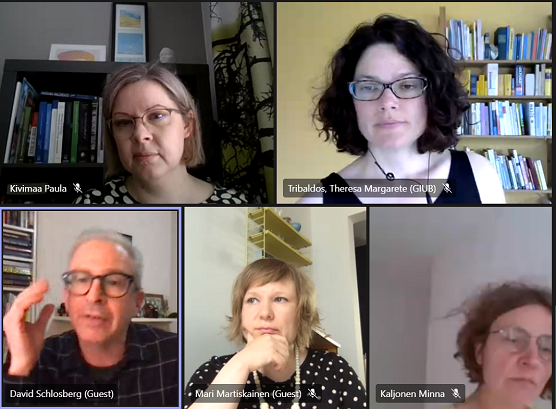
Justice in transitions webinar took place on 3 June 2021. © Anna Ott
At the public webinar “Justice in Transitions”, environmental social science scholars shared insights from their research on justice in sustainability transitions in the food system, energy system, and the textile industry. Link to the recording of the webinar as well as the slide shows can be found at the bottom of this page.
David Schlosberg, Professor of Environmental Politics at the University of Sydney, highlighted the disconnection between critical, intersectional environmental justice (EJ) in theory and the way sustainable system transition movements are taking up the discourse of environmental justice (EJ) in practise. The concepts of social and environmental justice of those movements include justice as a political and material participation, justice as the functioning of individuals and communities, and justice as opposing power. Justice as equity, justice as recognition, and the role of race, gender and the state were not thematised.
He therefore raises the questions of how critical the justice of just transition is in practice and whether we can have just transition of material systems without attention to broader oppressions and injustices.
Mari Martiskainen, Senior Research Fellow at Sussex Energy Group at the University of Sussex, described justice research in the context of different European energy transitions. She highlighted that energy and transport poverty, which relate to the affordability of and the access to energy and transport, are key issues in low carbon transitions. Their research has revealed specific groups that are influenced by energy and transport poverty, thereby drawing attention to those who are left behind by low carbon transitions.
Minna Kaljonen, Research Professor of Sustainability Transformations at the Finnish Environment Institute, reflected on how different dimensions of justice, including distributive, recognitive, procedural, and restorative justice emerge in just food system transition politics and action. She discussed how these dimensions intersect in the mitigation of climate emissions from farmed peatlands, in the development of sustainable school meals for all and in claiming for food justice via community supported agriculture. The examples highlight the need to go beyond distributive impacts in fostering just transition in food systems. Rather than compensating losses, we should look how to build capabilities for more sustainable food systems.
Finally, Paula Kivimaa, Research Professor in Climate and Society at the Finnish Environment Institute and member of the Finnish Climate Panel, in reaction to the three keynote speeches, highlighted that today’s political discussions, often only focus on the costs of climate change action, while the negative social implications of climate change and the current system are not talked about. She argued that climate policy should not only try to avoid new injustices from emerging but also mitigate current injustices. She further raised the question of how to address the dilemma of perceptions vs. actions, i.e. the fact that even though attempts are made, for example, for distributive justice, the outcome of actions and transitions might still be perceived as unjust. Finally, Kivimaa also wondered if social justice is just considered as a question between humans or what value is given to animals and nature in the justice discussion in general.
All the speakers called for more critical reflection and research on how justice gets interpreted in different contexts. This calls for inter- and transdisciplinary research and learning across system transitions.
The webinar was co-organised by the REFLECT and the Just food projects.
You can find the recording and the presentation materials from the event page.
More information
- Researcher Anna Ott , Finnish Environment Institute SYKE, firstname.lastname@syke.fi, tel. +358 295 252 202